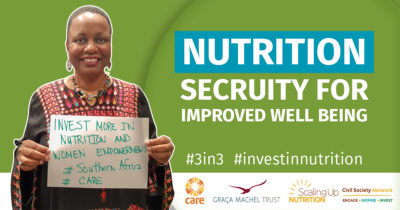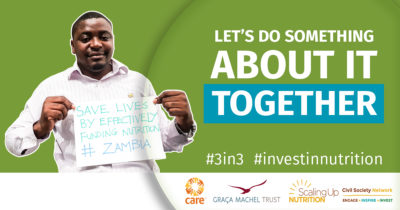
CARE International and the Graça Machel Trust (GMT) through the East and Southern Africa Civil Society Nutrition Network (ESA CSN) jointly commissioned a study to establish baseline national budget nutrition commitments and expenditures. The study, East and Southern Africa (ESA) National Budget Commitment to Nutrition, clearly shows not enough is being spent on nutrition.
The study, covers nine countries, Kenya, Madagascar, Malawi, Mozambique, Rwanda, South Sudan, Tanzania, Zambia, and Zimbabwe. Despite evidence on the importance of nutrition to national development, the report has found that most governments are not meeting the levels of investment recommended to achieve the nutrition targets in the Sustainable Development Goals, to which all countries have subscribed.
Below are some glaring facts established by the study:
- All the countries failed to meet the World Bank recommendation of US$30 on nutrition per every under-five child from their own national resources that some countries pledged to in the Nutrition for Growth Summit Commitments.
- Even with donor support, only three countries, South Sudan, Rwanda, and Malawi managed to meet the US$30 investment on nutrition per child under five target.
- Without donor support, the Governments of South Sudan, Rwanda and Malawi spent just $0.15, $9.48 and $2.42 respectively on nutrition for each under-five child, revealing a heavy dependence on donors.
- Despite some progress registered in the reduction of stunting rates, there is uncertainty over the sustainability of these outcomes because of the heavy dependence on donor support.
- In Mozambique and Zambia, donors account for over 67% of nutrition funding, while it is the highest in South Sudan, at 84%.
- According to the study, of the nine countries, Malawi allocated the most to nutrition from national resources, at 58% of the total national budget, increasing to 1.15% when donor support is incorporated.
- The lowest national budget allocation to nutrition, excluding donor support, was from South Sudan, at 0.09%, even though the overall national investment on nutrition stands at 0.5% of the national budget.
- The average allocation to nutrition as a share of the national budget across the nine countries was 0.45%.

Civil Society Scaling Up Nutrition partners are using this report to advocate for sustainable pathways to ensure governments take full responsibility of the nutrition agenda, including allocating and spending at least 3% national budget to nutrition, among other measures. Governments are encouraged to explore creative ways of meeting the “nutrition for growth summit recommendation” of spending $30 per every under-five child to fight malnutrition, especially stunting, which has serious long-term implications on cognitive development. Being a multifaceted issue, the report further recommends that nutrition be mainstreamed into national development plans and policies.
Learn more on the East and Southern Africa (ESA) National Budget Commitment to Nutrition Report here










 The Trust supports and mobilises civil society networks on issues of ending child marriage, ending violence against children, ending female genital mutilation and promoting children’s rights, to carry out advocacy and action across Africa. Special focus is placed on Malawi, Mozambique, Tanzania and Zambia where child marriage continues to be a problem largely driven by poverty, gender inequality, harmful traditional practices, conflict, low levels of literacy, limited opportunities for girls and weak or non-existent protective and preventive legal frameworks.
The Trust supports and mobilises civil society networks on issues of ending child marriage, ending violence against children, ending female genital mutilation and promoting children’s rights, to carry out advocacy and action across Africa. Special focus is placed on Malawi, Mozambique, Tanzania and Zambia where child marriage continues to be a problem largely driven by poverty, gender inequality, harmful traditional practices, conflict, low levels of literacy, limited opportunities for girls and weak or non-existent protective and preventive legal frameworks.




 Education is a fundamental right for all children, which is also a vehicle for social, economic and political transformation in communities, countries and the African continent at large. Recent studies indicate a lack of progress in some of the critical commitments aimed at improving education quality, access, retention and achievement, particularly for girls. In most African countries, girls may face barriers to learning, especially when they reach post-primary levels of education. By implementing multi-dimensional approaches to education which includes core education, personal development, life skills and economic competencies, the Trust partners with funding partners, governments, civil societies and the private sector to improve education access.
Education is a fundamental right for all children, which is also a vehicle for social, economic and political transformation in communities, countries and the African continent at large. Recent studies indicate a lack of progress in some of the critical commitments aimed at improving education quality, access, retention and achievement, particularly for girls. In most African countries, girls may face barriers to learning, especially when they reach post-primary levels of education. By implementing multi-dimensional approaches to education which includes core education, personal development, life skills and economic competencies, the Trust partners with funding partners, governments, civil societies and the private sector to improve education access.

 The Nutrition and Reproductive, Maternal, New-born, Child and Adolescent Health and Nutrition, (RMNCAH+N) of the Children’s Rights and Development Programme aims at promoting the Global Strategy for women, children and adolescents’ health within the Sustainable Development Goals (SDG) agenda. The strategy emphasises on the importance of effective country leadership as a common factor across countries making progress in improving the health of women, children and adolescents.
The Nutrition and Reproductive, Maternal, New-born, Child and Adolescent Health and Nutrition, (RMNCAH+N) of the Children’s Rights and Development Programme aims at promoting the Global Strategy for women, children and adolescents’ health within the Sustainable Development Goals (SDG) agenda. The strategy emphasises on the importance of effective country leadership as a common factor across countries making progress in improving the health of women, children and adolescents. Through its Early Childhood Development (ECD) plan, The Trust will seek to put into action the new science and evidence Report that was presented by Lancet Series on Good and early development – the right of every child. This will be achieved by mobilising like-minded partners to contribute in the new science and evidence to reach all young children with ECD. The Trust’s goal is to be a catalyst for doing things differently, in particular, to rid fragmentation and lack of coordination across ECD sectors. In response to evidence showing the importance of political will in turning the tide against the current poor access and quality of ECD. Even before conception, starting with a mother’s health and social economic conditions, the early years of a child’s life form a fundamental foundation that determines whether a child will survive and thrive optimally.
Through its Early Childhood Development (ECD) plan, The Trust will seek to put into action the new science and evidence Report that was presented by Lancet Series on Good and early development – the right of every child. This will be achieved by mobilising like-minded partners to contribute in the new science and evidence to reach all young children with ECD. The Trust’s goal is to be a catalyst for doing things differently, in particular, to rid fragmentation and lack of coordination across ECD sectors. In response to evidence showing the importance of political will in turning the tide against the current poor access and quality of ECD. Even before conception, starting with a mother’s health and social economic conditions, the early years of a child’s life form a fundamental foundation that determines whether a child will survive and thrive optimally.